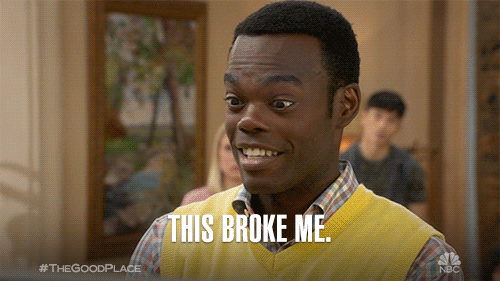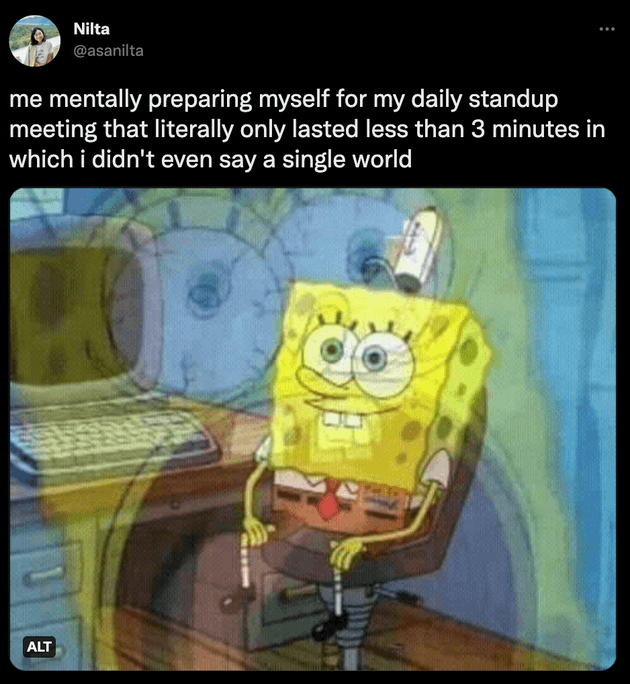TL;DR: I rant about scrum in this entry. Definitely not scientific or well researched. Head over to Gergely’s How Big Tech Runs Tech Projects and the Curious Absence of Scrum article if you want to read a more structured thought on to scrum or not to scrum.
This year I went through some big changes. I even had to make new decisions for the same problems that I have tackled previously. For instance, I had to re-fill my house, which means I had to choose some furnitures and electronics from the never ending options of cool stuffs! Unfortunately, those things that other people don’t even think twice before deciding, might stay a bit longer in my head.
I feel like Chidi (from The Good Place), thinking that I’m in the good place where actually I’m just in hell.
Life has been more settled since then, so I decided to do some thinking. A reflections. One of those reflections brings me to scrum. I know, what the heeell, but this is the story.
My first encounter with scrum is at a workplace, we were going OK with the current system at the time, but the upper managements want to have more visibility on the projects and team productivity, so we started the process.
Scrum has ceremonies, like stand-ups, refinements, plannings, and retrospective. I have a weird stand regarding meetings. Depending on the role that I hold at the company, I might be either:
- really comfortable with meetings, even to the point that I feel more useful and full of ideas during meetings, or
- I really wish that I don’t have to do any meetings at all, especially daily stand-ups.
Stand-ups are never long, 15 mins at most, but these tweets summarize my feeling on stand-ups. That’s why there’s a time where I started working at two or three am, just to get things done, because I know that stand-up will drain all of my energy.
Another thing that’s kind of tightly coupled to scrum is story point. When I first experienced scrum, nobody care that much on the story point, we just gave a very rough estimation. But then came a time when we have to do it religiously, which means story point is a quantitative prediction of the task complexity, no matter who does the task.
“Ok, no problem,” said me, convincing myself. “It’s just another prediction that’ll be done among us, in the team. Don’t let the ‘no matter who does it’ confuse you. Just think as if it’s you who do it”.
I have this love and hate relationship with numbers. When I was a kid, I was “forced” to be good with number, so, number always give me more pressure ~and pleasure~. For me, giving estimation with S, M, or L is soooo much easier than using number. Usually there’re only four options with the sizes (S, M, L, XL), but, virtually unlimited options with Fibonacci number. As you’ve noticed from the very first paragraph of this entry, I have problem with options!
And of course my suffering doesn’t end there.
Once, I had been in a quarter planning meeting where we have to give point to projects! No, not a task, not a story, we have to estimate PROJECT point, with no detailed requirements! We had a company wide meeting, which means I don’t have that “It’s just another prediction that’ll be done among us, in the team” to help calm me down.
During the meeting, you’ll get questioned, “why did you put this big of a number here, when our team only put this small number for this kind of a project?” Turns out, the standard point is different. Our 8 kind of means 5 in theirs. Different standard means different timeline calculation. Our 60 points can be translated to two weeks work, while in theirs it’s a month work.

In the hope of I’m not alone, I did simple survey on my instagram, with a very small pool of respondents.
Do you use scrum at work (or personal project?)
Do you know how to give points to a story?
How well do you think your story point estimation is?
I think I got the validation that I wanted. Haha.
As an easily distracted person, I think scrum makes it hard for me to test my limit. It’s always making me too careful - I don’t want to be that person who doesn’t finish her tasks and get judged at retrospective, because it makes the burnout chart looks ugly. On the other hand, I had been challenged that my team take it too easy because we always reach above 95% completion rate. Confusing, right? Can’t left too many tasks, can’t finished too many tasks as well.
It also makes me feels too “safe”, because I have two weeks to finish things, so, in a way, I can’t feel the urgency, thus the distractions always win! I’ll do all the unnecessary things and left the big chunk of work ‘till the last weekend.
Since I still need job, I know that I have to step up my game and just be comfortable with all the unpleasantries, but if lots of people are not comfortable with giving points, why keep doing it? If we can just update the docs to report progress, why bother with stand-ups?
Honestly, among all places that I’ve worked for, I could give more than my 100% at the place that didn’t really implement scrum. Granted, I didn’t have a good work life balance there, but let’s safe it for another time. We didn’t have daily stand-ups, but we try to split the task such that each card will represent a day work. So, if you’re not moving any card that day, everyone knew you’re stuck, so please raise your blocker asynchronously.
No need to think about the task complexity, comparing it to other tasks or other people as well. Just create card based on what you think you can do in a day, because we’ve decided who’s going to do a project before splitting the task as well! So simple for me. Weighing too many factors are really weighing me down to an extent that I might be considered as not productive by others. It’s hurting my self confidence.
We also did weekly sync to make sure that the whole team is aware of the ongoing and upcoming projects. As for retrospective, we did it at the end of a project, or when the project leader think that it’s needed.
But maybe, I’ve never been in a high enough position to understand the benefit of scrum (especially the story point). Of course it’ll be easier to quantify everything when you have number, instead of S, M, L, or counting number of cards which might not represent how big a project actually is.
Maybe, I should just stop overthinking this. I should stop giving too much weight to the story points, more than what it deserves. Just like creating this blog, stop thinking, do the necessary, and move on.



